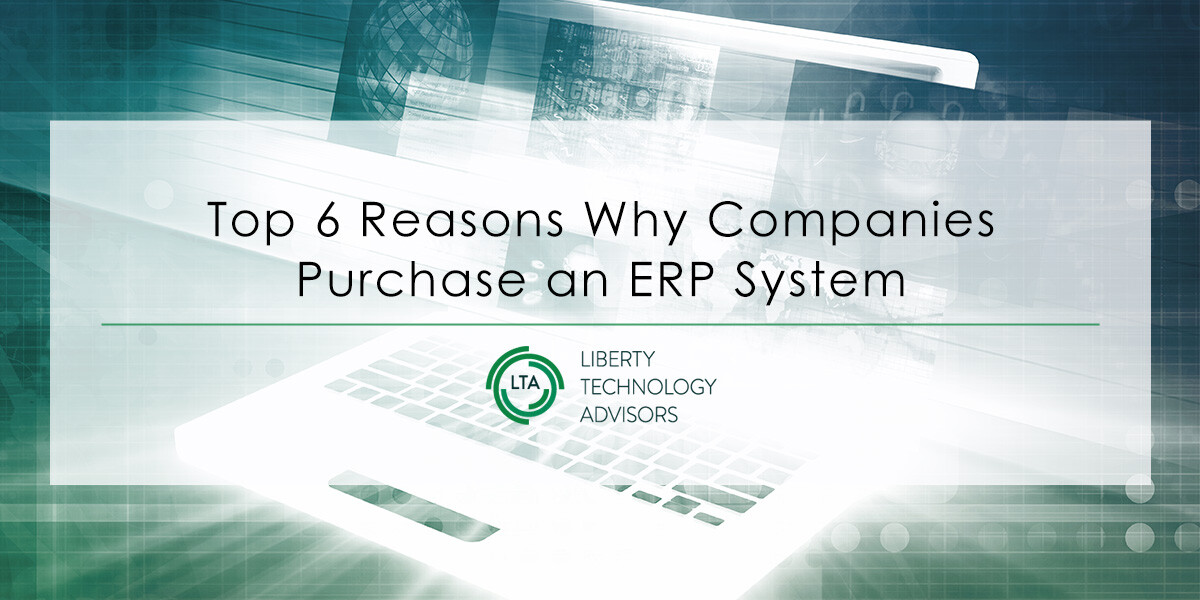3 min read
Top 6 Reasons Why Companies Purchase an ERP System
Liberty Technology Advisors : Updated on October 15, 2024

By now you may be familiar with Enterprise Resource Planning (ERP) systems and the many advantages an ERP system can bring a company. But why do organizations implement such systems? Below, we will highlight the top 6 reasons why businesses may implement an ERP system.
1. LEGACY SYSTEMS
One of the most common reasons why companies purchase an ERP system is because their existing legacy system simply isn’t worth the pain or expense, and a decision is made that it’s time to cut loose. We are increasingly seeing legacy systems that are no longer supported (or ‘sunsetted’) and thus have outstayed their welcome through stale functionality and increased risk of failure.
Old technology is often far more expensive to maintain than newer, lighter systems, from a general maintenance point of view. Additionally, as the system code or platform age, it becomes more difficult and more expensive to find a support team who is familiar with the outdated system.
Companies who are still functioning with legacy systems also find that they can have security issues, a lack of modern features and functionality and a lack of flexibility to customize or integrate. The system becomes a ball and chain for the organization to grow.
2. GROWTH
Like how children experience growing pains, so to do companies - it’s a part of growing up after all. As a business becomes more and more established in a market, it’s likely that pre-existing - or ‘foundation’ - processes and systems are no longer a good fit.
This growth, known as organic growth, oftentimes calls for more than just a simple accounting system. During growth strategy execution, common complexities such as managing multiple locations, dealing with increased staff communication needs, and the need to better manage processes arise that legacy or basic systems simply cannot handle.
In addition, as an organization grows, so too does the importance of departmental information management and information flow. The process of sharing information across departments becomes a challenge as the information becomes trapped in the department silo and is not easily accessible.
Along with organic growth, companies can also experience non-organic growth such as mergers and acquisitions. An acquisition strategy may include a system that can be flexible in adopting and incorporating multiple ways of managing and tracking a business. That strategy may also include a system that is easy and fast to rollout at newly acquired companies or branches.
3. DIVESTITURE
It’s not uncommon to see companies looking to re-focus their operations, especially when a subsidiary of the organization is underperforming or doesn’t fit with future goals and direction. While a subsidiary may be experiencing little to no growth as a part of the larger corporation, it may be quite valuable to sell as an independent operation.
For subsidiaries that have become spun off, it is natural that they will need to invest in a different sized system and start over with clean data and tailored data fields. Additionally, for a company spinning off a division or product, a new ERP system can facilitate the change of focus away from a product or service, and help achieve a ‘clean break’.
4. CHANGE AGENT
An ERP is a good way to facilitate cultural change within an organization. Implementing an ERP system sets boundaries and expectations on ‘how we do things’ and what is acceptable. It often ensures a company becomes more accountable with streamlined internal processes, improved reporting, and is an opportunity to set a focus on what should be tracked within the company.
Companies undergoing a strategic direction change also commonly reach for an ERP system. They may be looking at changing a product line, a service line, or looking to change the branding of the organization- a practice which starts internally.
5. SILOED DEPARTMENTS OR LOCATIONS
ERP’s provide vision into inter-departmental activities and situational awareness that is impossible to obtain without an ERP. They allow companies to use the same information across departments, stamping out the risk filled, time-consuming, money wasting practice of duplicate data entry.
Companies will also move to an ERP when they need to establish governance to ensure distributed teams operate and function the same way across the organization. Risk reduction is found in reducing the occurrence of people or locations doing a similar process in vastly different ways.
6. KEEPING UP WITH THE COMPETITION - BUSINESS ADVANTAGE THROUGH TECHNOLOGY
An ERP has become a ‘must have’ for any company looking to remain competitive, as increasingly organizations look to technology to gain competitive advantages.
Companies are looking for quicker access to information, statistics and history in order to make decisions in a more expedited manner. They are also looking to improve the customer experience without adding additional costs associated with higher headcounts.
With hundreds of ERP implementations under their belt, Liberty Technology Advisors know what questions to ask and know what’s reasonable (and unreasonable) when it comes to the implementation and contractual negotiations. You wouldn’t walk into a restaurant blindfolded and hope you pick the right meal for you, so why should you do the same with something as important as an ERP system? Contact the team at Liberty Technology Advisors to get the ball rolling on your ERP selection, implementation and business optimization.